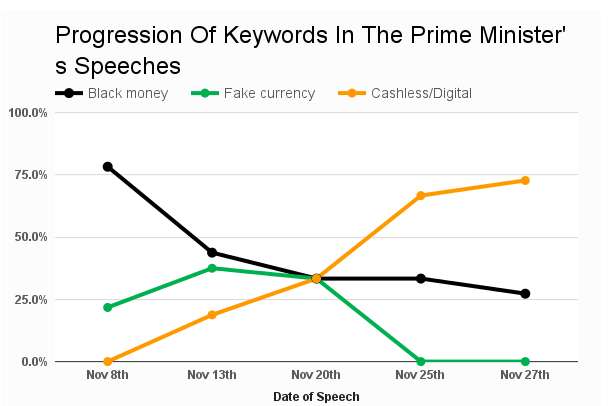Modi spoke at Jan Sabha because he's afraid of accountability in Parliament

On 10 November, Prime Minister Narendra Modi addressed a rally in Gujarat, telling those in attendance he was speaking to a Jan Sabha as he wasn't being allowed to speak in Lok Sabha. It seems an absurd claim from a man whose party controls more than half the seats, 282, in the Lok Sabha,
However, if we are to examine Modi's ever changing rhetoric on demonetisation, it becomes amply evident that the PM, cornered by the increasingly abysmal results of the move, wants nothing more than to continue avoiding Parliament.
Modi's changing rhetoric
Since then, as IndiaSpend lucidly pointed out in a graphic, Modi's narrative has changed remarkably. As the shoddy implementation of the move unleashed death and deprivation across the nation, and after finding an ally in PayTM, Modi started to sing an altogether different tune. Suddenly, what followed his trademark salutation - a nasal 'mitron' - was no longer 'kaala dhan', but ramblings about a cashless economy and online transactions.

It isn't hard to understand why the Modi train changed tracks either. Every passing day brings with it more demonetisation deaths, while the people the move was meant to target seem untouched or at least innovative enough to find ways to bypass the government regulations.
Now, at rallies, his radio address and probably in his sleep as well, Modi clings desperately to his "cashless vision" like a drowning man in stormy seas. Black money, originally pitched as the heartbeat of this harebrained scheme, now only finds fleeting mention, if it's mentioned at all.
Also read -Five notes Modi should introduce on the monthversary of demonetisation
However, the black money spiel isn't dead. It returns when Modi has to combat political opponents. This leads to a dual narrative of black money when battling political rivals, and cashless reforms when trying to sell the idea to an increasingly cynical public.
An analysis of this dual approach and the different contexts in which they are used shows not just the hollowness of both approaches, but also exposes the Prime Minister's fear of being held accountable in public.
Back to black
When opposition parties began putting pressure on the government over the move, Modi brought back the black money narrative. Faced with report after report about the various ways the demonetisation move was failing, Modi, rather than rebut these reports with facts of his own, resorted to accusing his opponents of supporting black money hoarders.
After avoiding Parliament for as long as possible, Modi beat a hasty retreat on his first visit to the Lok Sabha, not uttering a word in the face of opposition speeches on the issue. On his next visit to Parliament, this time facing the Rajya Sabha, Modi was thoroughly lambasted by ex PM Manmohan Singh. As Singh, an accomplished economist, eviscerated Modi's demonetisation move, the present PM looked visibly shaken, not uttering a word.
But while he remained mute in Parliament, Modi magically found his tongue the following morning when he accused the opposition parties of being upset because they weren't given prior notice to hide their black money.
Also read -Modi's cheerleaders: Bollywood needs to shut up about demonetisation
Similarly, when the opposition parties observed a "black day" to mark 30 days of demonetisation, Union Minister Venkaiah Naidu rubbished it, calling it a "black money support day". However, the selective use of the black money refrain exposes the flimsy nature of Modi's cashless economy.
The fact that it is primarily invoked to attack rival parties, means the black money narrative is now reduced to nothing more than an ad hominem logical fallacy - attacking the character of the opposition to undermine the strength of their arguments. While it buys the PM momentary wiggle room, this approach lays bare the failure of demonetisation to achieve any sense of reform.
When faced with facts, figures and a platform where communication is a two-way street, Modi has no real response. His inability to counter facts with facts, makes it clear that reality just isn't on his side. As report after report arms the opposition parties with enough to obliterate the impenetrable facade he has built for himself, Modi is left with no choice but to play truant.
Preaching to the public
When Modi is addressing the public, however, he suddenly seems to have all the answers. In fact, he has so many answers that the black money narrative he uses when confronted by opponents is seemingly forgotten. Secure in the knowledge that he cannot be questioned, Modi launches into a litany of tall claims.
Also read - RSS labour wing BMS hits out at Modi: 'Note ban has failed completely'
He speaks of his vision for a cashless society - a vision he seemingly hadn't had at the time he made the demonetisation announcement. He implores the country to take advantage of the internet, while fully aware that not more than 15% of the country has access to decent, if any, internet. He talks of net banking, while India's encryption technology is outdated, making online transactions vulnerable to attack. Inspired by two-year-old parody videos, he tells tales of of beggars using swipe machines.
He speaks of Scandinavian countries that have gone largely cashless, exhorting followers to go cashless to take India forward. What he fails to mention is that thee countries didn't become well developed because they went cashless but went cashless because they were already well developed.
Still, in Modi's one-way show, in front of an audience assembled by and consisting of BJP workers, his delusions are met with cheers. This would not be the case in parliament where his half-truths and outlandish claims would be torn to shreds by well informed peers.
This is why Modi prefers preaching to the public rather than Parliament. Modi isn't worried he won't be heard, he's worried he will be questioned and has no answers to give.
First published: 11 December 2016, 19:41 IST






![BJP's Kapil Mishra recreates Shankar Mahadevan’s ‘Breathless’ song to highlight Delhi pollution [WATCH] BJP's Kapil Mishra recreates Shankar Mahadevan’s ‘Breathless’ song to highlight Delhi pollution [WATCH]](https://images.catchnews.com/upload/2022/11/03/kapil-mishra_240884_300x172.png)

![Anupam Kher shares pictures of his toned body on 67th birthday [MUST SEE] Anupam Kher shares pictures of his toned body on 67th birthday [MUST SEE]](https://images.catchnews.com/upload/2022/03/07/Anupam_kher_231145_300x172.jpg)




_in_Assams_Dibrugarh_(Photo_257977_1600x1200.jpg)

